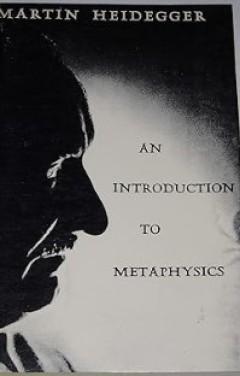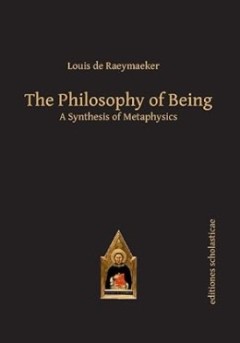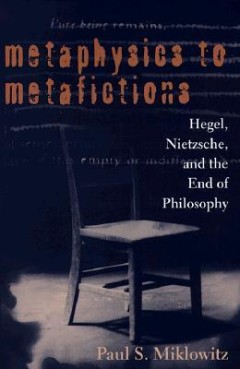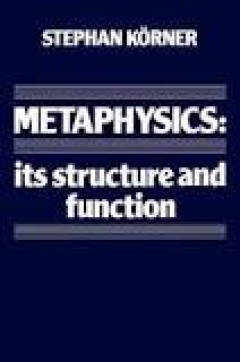Ditapis dengan

Being and Having : An Existentialist Diary
- Edisi
- First Published
- ISBN/ISSN
- -
- Deskripsi Fisik
- 236 pgs.; 21 cm.
- Judul Seri
- -
- No. Panggil
- 110 GAB b
- Edisi
- First Published
- ISBN/ISSN
- -
- Deskripsi Fisik
- 236 pgs.; 21 cm.
- Judul Seri
- -
- No. Panggil
- 110 GAB b

An Introduction to Metaphysics
Contains a series of lectures delivered by Heidegger in 1935 at the University of Freiburg. In this work Heidegger presents the broadest and most intelligible account of the problem of being, as he sees this problem. First, he discusses the relevance of it by pointing out how this problem lies at the root not only of the most basic metaphysical questions but also of our human existence in its p…
- Edisi
- -
- ISBN/ISSN
- 030007405
- Deskripsi Fisik
- x + 214 pg.; 20,5 cm.
- Judul Seri
- -
- No. Panggil
- 110 HEI m

The Philosophy of Being : A Synthesis of Metaphysics
The choice of the basis of metaphysics is of capital importance. This basis ought to guarantee the very existence and validity of metaphysics, while at the same time giving this science its formal object and a solid foundation. But if metaphysics is bound up with the study of a universal unity or of the totality of things and, if then, our inquiry ought to be concerned with the whole, how can w…
- Edisi
- First Published
- ISBN/ISSN
- -
- Deskripsi Fisik
- xii + 360 pgs.; 22 cm.
- Judul Seri
- -
- No. Panggil
- 110 RAE p

Homo Viator : Introduction to Metaphysic of Hope
- Edisi
- First Published
- ISBN/ISSN
- -
- Deskripsi Fisik
- 270 pgs.; 20 cm.
- Judul Seri
- -
- No. Panggil
- 110 MAR h
- Edisi
- First Published
- ISBN/ISSN
- -
- Deskripsi Fisik
- 270 pgs.; 20 cm.
- Judul Seri
- -
- No. Panggil
- 110 MAR h

Metaphysics to Metafictions: Hegel, Nietzsche, and The End of Philosophy
Through close reading, and interpretive reflections, Paul Miklowitz examines key dialectics in Hegel's Phenomenology of Spirit in order to come to terms with the undoing of the Hegelian system of totality inaugurated by Nietzsche. In examining Nietzsche's post-apocalyptic and anti-Hegelian perspectivism, Miklowitz focuses on Thus Spoke Zarathustra, offering a new interpretation of "eternal retu…
- Edisi
- First Published
- ISBN/ISSN
- 0-7914-3877-5
- Deskripsi Fisik
- 221 hlm.; 22,5 cm.
- Judul Seri
- -
- No. Panggil
- 193 MIK m

Metaphysics
- Edisi
- -
- ISBN/ISSN
- -
- Deskripsi Fisik
- xiv + 107 pg.; 23 cm.
- Judul Seri
- Foundation of Philosophy Series
- No. Panggil
- 110 TAY m
- Edisi
- -
- ISBN/ISSN
- -
- Deskripsi Fisik
- xiv + 107 pg.; 23 cm.
- Judul Seri
- Foundation of Philosophy Series
- No. Panggil
- 110 TAY m

Metaphysics
This book provides an introduction to metaphysics. At the outset Professor Hamlyn distinguishes two conceptions of metaphysics running through the history of the subject. One, which goes back to Aristotle, is concerned with ontology, and with what has to exist for beings such as we are; the other separates appearance and reality and attempts to establish what really exists. Professor Hamlyn's a…
- Edisi
- -
- ISBN/ISSN
- 0521244498
- Deskripsi Fisik
- vii + 230 pg.; 21,5 cm.
- Judul Seri
- -
- No. Panggil
- 110 HAM m

Our Place In The Universe
- Edisi
- -
- ISBN/ISSN
- 0631167773
- Deskripsi Fisik
- x + 212 pg.; 22 cm.
- Judul Seri
- -
- No. Panggil
- 110 SMA o
- Edisi
- -
- ISBN/ISSN
- 0631167773
- Deskripsi Fisik
- x + 212 pg.; 22 cm.
- Judul Seri
- -
- No. Panggil
- 110 SMA o

Metaphysics: Its Structure and Function
- Edisi
- -
- ISBN/ISSN
- 0521264960
- Deskripsi Fisik
- xi + 238 pg.; 23 cm.
- Judul Seri
- -
- No. Panggil
- 110 KOR m
- Edisi
- -
- ISBN/ISSN
- 0521264960
- Deskripsi Fisik
- xi + 238 pg.; 23 cm.
- Judul Seri
- -
- No. Panggil
- 110 KOR m

Metaphysics and the philosophy of Mind: Collected Philosophical Papers Volume II
- Edisi
- -
- ISBN/ISSN
- 0816610800
- Deskripsi Fisik
- x + 239 pg.; 23 cm.
- Judul Seri
- -
- No. Panggil
- 110 ANS m
- Edisi
- -
- ISBN/ISSN
- 0816610800
- Deskripsi Fisik
- x + 239 pg.; 23 cm.
- Judul Seri
- -
- No. Panggil
- 110 ANS m
 Karya Umum
Karya Umum  Filsafat
Filsafat  Agama
Agama  Ilmu-ilmu Sosial
Ilmu-ilmu Sosial  Bahasa
Bahasa  Ilmu-ilmu Murni
Ilmu-ilmu Murni  Ilmu-ilmu Terapan
Ilmu-ilmu Terapan  Kesenian, Hiburan, dan Olahraga
Kesenian, Hiburan, dan Olahraga  Kesusastraan
Kesusastraan  Geografi dan Sejarah
Geografi dan Sejarah